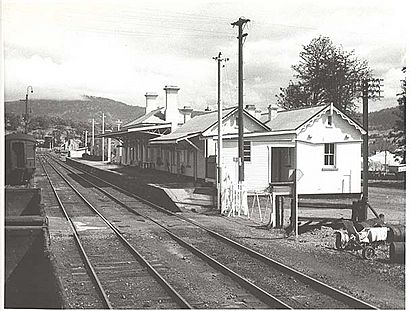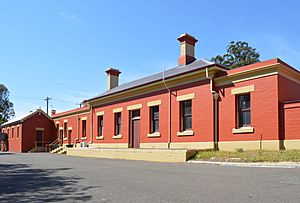Murrurundi railway station facts for kids
Quick facts for kids
Murrurundi
|
|||||||||||||
|---|---|---|---|---|---|---|---|---|---|---|---|---|---|

Northbound view, pictured in 1962.
|
|||||||||||||
| Location | Victoria Street, Murrurundi | ||||||||||||
| Coordinates | 31°46′06″S 150°50′22″E / 31.768329°S 150.839463°E | ||||||||||||
| Owned by | Transport Asset Holding Entity | ||||||||||||
| Operated by | NSW TrainLink | ||||||||||||
| Line(s) | Main Northern | ||||||||||||
| Distance | 352.30 km (218.91 mi) from Central | ||||||||||||
| Platforms | 1 | ||||||||||||
| Tracks | 3 | ||||||||||||
| Construction | |||||||||||||
| Structure type | Ground | ||||||||||||
| Disabled access | Yes | ||||||||||||
| Other information | |||||||||||||
| Station code | MDI | ||||||||||||
| History | |||||||||||||
| Opened | 4 April 1872 | ||||||||||||
| Services | |||||||||||||
|
|||||||||||||
|
|||||||||||||
| Official name | Murrurundi Railway Station group | ||||||||||||
| Type | State heritage (complex / group) | ||||||||||||
| Designated | 2 April 1999 | ||||||||||||
| Reference no. | 1205 | ||||||||||||
| Type | Railway Platform/ Station | ||||||||||||
| Category | Transport - Rail | ||||||||||||
The Murrurundi railway station is a special, heritage-listed train station. It is located in the town of Murrurundi in New South Wales, Australia. This station is part of the Main Northern line. It was built a long time ago, between 1872 and 1917.
The station is also known as the Murrurundi Railway Station group. It first opened its doors on 4 April 1872. For a few years, Murrurundi was the very last stop on the train line. Then, on 13 August 1877, the line was extended further to Quirindi. Because of its history and importance, the station was added to the New South Wales State Heritage Register on 2 April 1999.
Contents
Train Services
Murrurundi station is served by NSW TrainLink. They run a daily train service called the Northern Tablelands Xplorer. This train travels between Armidale/Moree and Sydney.
It's important to know that Murrurundi is a request stop. This means the train only stops here if passengers have booked a ticket to get on or off at this station.
| Platform | Line | Stopping pattern | Notes |
| 1 |
North West Region
|
Services to Sydney, Armidale & Moree | request stop (booked passengers only) |
|---|
Station History
From 1891 until August 1965, Murrurundi had a special area for trains called a locomotive depot. This depot had four tracks and was located north of the station. It was mainly used for "bank engines." These were extra powerful engines that helped push trains up the very steep hills over the Liverpool Range. This steep section led to the Ardglen Tunnel north of the town. There was also a train yard, which is like a parking area for trains, across from the station.
Station Buildings and Features
The Murrurundi station has one platform where passengers get on and off trains. It also has a "passing loop," which is an extra track that allows trains to pass each other. The station area includes several buildings and structures:
- A brick station building with a sloped roof, built in 1872.
- Another brick building with a pointed roof, also built around 1872.
- A section that connects these two buildings, possibly added in 1891.
- An open timber "signal box" built in 1917. A signal box is where railway workers control the train signals and tracks.
- A timber storage building with a flat, slanted roof.
- The platform itself is made of brick.
Why Murrurundi Station is Special
Murrurundi was once a very important place for trains. It had a large depot for locomotives, but those parts have since been removed. The buildings and structures that are still there are great examples of their kind.
The station is especially interesting because it has two main buildings built around the same time but in different styles. The main building is a fine example of a "second class" station building. The other is a simpler building with a pointed roof. The part that connects them and adds a roof over the platform is also very important.
The station is a significant landmark in Murrurundi. Along with the nearby Temple Court station, it forms an important group of historic railway structures.
The Murrurundi railway station was added to the New South Wales State Heritage Register on 2 April 1999. This means it is recognized as a special place with historical value. It is considered historically rare because of its unique past.
 | Jessica Watkins |
 | Robert Henry Lawrence Jr. |
 | Mae Jemison |
 | Sian Proctor |
 | Guion Bluford |


